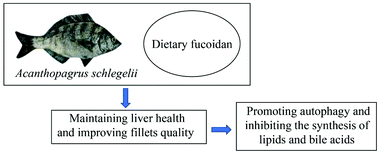Dietary fucoidan extracted from macroalgae Saccharina japonica alleviate the hepatic lipid accumulation of black seabream (Acanthopagrus schlegelii)†
Abstract
The use of an artificial diet often leads to the increase of risk factors for the development of liver diseases, such as hepatic lipid accumulation (HLA) in commercially cultured fish species. Our previous study showed that dietary Saccharina japonica could effectively alleviate HLA in black seabream (Acanthopagrus schlegelii), which may be linked predominantly to S. japonica fucoidan. Thus, a 56d nutritional trial was designed to investigate the effects of dietary fucoidan (CTRL, 0 g kg−1; ASJ1, 0.75 g kg−1; ASJ2, 3.00 g kg−1) on growth performance, fillets nutritional values, and HLA of black seabream. Results showed that dietary fucoidan significantly improved the growth and the contents of n-3 polyunsaturated fatty acids (n-3PUFA) in fillets of black seabream. Moreover, dietary fucoidan improved HLA-related parameters, including reducing serum and liver lipid contents and the activity of aminotransferase. Meanwhile, histological analysis showed that dietary fucoidan reduced the area of hepatic lipid droplets in black seabream (P < 0.05). In addition, the transcriptomic analysis of differentially expressed gene (DEG) showed that all DEG in fatty acid metabolism, primary bile acid biosynthesis, and fatty acid biosynthesis were down-regulated, and all DEG in the regulation of autophagy were up-regulated in the ASJ1 group compared with CTRL group. Moreover, the metabolomic analysis of differentially expressed metabolite (DEM) found that lipid metabolism was the main type of KEGG pathway altered by fucoidan supplementation. Furthermore, the combined transcriptomic and metabolomic analysis found that dietary fucoidan mainly modified the lipid metabolic pathway of primary bile acid biosynthesis, glycerophospholipid metabolism, and arachidonic acid metabolism in the liver. In general, dietary fucoidan effectively alleviated HLA of black seabream, and the underlying mechanism may be ascribed to promoting the autophagy and inhibiting the synthesis of lipids and bile acids.



 Please wait while we load your content...
Please wait while we load your content...